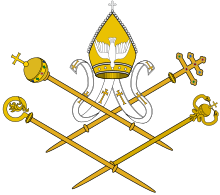| Patriarchate of Cilicia | |
|---|---|
| Catholic | |
 Coat of arms Coat of arms | |
| Incumbent: Raphaël Bedros XXI Minassian elected 23 September 2021 | |
| Location | |
| Headquarters | Beirut |
| Information | |
| First holder | Abraham Petros I Ardzivian (Independent) |
| Denomination | Eastern Catholic |
| Sui iuris church | Armenian Catholic Church |
| Rite | Armenian Rite |
| Established | 1742 |
| Cathedral | Cathedral of St Elias and St Gregory the Illuminator |
| Website | |
| www.armeniancatholic.org/ | |
The Patriarchate of Cilicia (Latin: Patriarchatus Ciliciae Armenorum) is an ecclesiastical jurisdiction and the only patriarchate of the Armenian Catholic Church of the Catholic Church. The territorial jurisdiction of the Patriarch of Cilicia is the Archeparchy of Beirut, over which the Patriarch of Cilicia holds ordinary authority. The St. Elie and St. Gregory the Illuminator Armenian Catholic Cathedral in Beirut, Lebanon, is the cathedra of the Patriarchate. The Patriarchate is headed by Patriarch Raphaël Bedros XXI Minassian elected in September 2021.
History
While the diocese of Cilicia dates back to 294, it was promoted to a patriarchate in 1742. In 1866, the seat of the patriarchate was moved to Constantinople, Ottoman Empire (now Istanbul, Turkey), and in 1928 to Beirut, Lebanon, where it remains today.
Ordinaries
Patriarchs
See also: List of Armenian Catholic patriarchs of Cilicia- Abraham Petros I Ardzivian (1740–1749)
- Hagop Petros II Hovsepian (1749–1753)
- Michael Petros III Kasparian (1753–1780)
- Parsegh Petros IV Avkadian (1780–1788)
- Gregory Petros V Kupelian [de] (1788–1812)
- Gregory Petros VI Djeranian [de] (1815–1841)
- Jacob Petros VII Holassian [de] (1841–1843)
- Gregory Petros VIII Derasdvazadourian [de] (1844–1866)
- Anthony Petros IX Hassun (1866–1881)
- Stephen Petros X Azarian [de] (1881–1899)
- Paul Petros XI Emmanuelian [de] (1899–1904)
- Paul Petros XII Sabbaghian [de] (1904–1910)
- Paul Petros XIII Terzian [de] (1910–1931)
- Avedis Petros XIV Arpiarian [de] (1931–1937)
- Gregory Petros XV Agagianian (1937–1962)
- Ignatius Petros XVI Batanian (1962–1976)
- Hemaiag Petros XVII Ghedighian (1976–1982)
- John Petros XVIII Kasparian (1982–1999)
- Nerses Petros XIX Tarmouni (1999–2015)
- Krikor Petros XX Gabroyan (2015–2021)
- Raphaël Bedros XXI Minassian (2021–)
Auxiliary bishops
- Robert Badichah [pl] (2024–)
See also
- List of Armenian Catholic Patriarchs of Cilicia
- Council of Catholic Patriarchs of the East
- Armenian diaspora
References
- ^ "Patriarchal See of Cilicia". GCatholic.org. Retrieved 2012-01-25.
- "Patriarchate of Cilicia (Armenian)". Catholic-Hierarchy.org. David M. Cheney.
- "The Eparchy of Constantinople (Turkey) of the Patriarchal Armenian Catholic Church". Armenian Catholic Church. Archived from the original on 2012-09-12. Retrieved 2012-01-25.
- "From the Eastern Churches". press.vatican.va. Retrieved 2024-04-03.
External links
This Armenia-related article is a stub. You can help Misplaced Pages by expanding it. |
This article about an Eastern Catholic diocese is a stub. You can help Misplaced Pages by expanding it. |
| Armenian Catholic Church hierarchy | ||
|---|---|---|
| Patriarchate |  | |
| Metropolitan archeparchies (archdioceses) |
| |
| Non-metropolitan archeparchies | ||
| Eparchies | ||
| Apostolic exarchates |
| |
| Ordinariates for Eastern Catholic faithful | ||
| Patriarchal exarchates |
| |
| Titular Archeparchies |
| |
| Titular Eparchies |
| |
| Former circumscriptions | ||
| Sui iuris particular churches of the Catholic Church | ||||||
|---|---|---|---|---|---|---|
| By ecclesiastical jurisdiction | ||||||
| Patriarchal churches |
|  | ||||
| Major archiepiscopal churches | ||||||
| Metropolitan churches | ||||||
| Other sui iuris churches | ||||||
| Religion |
| ||||||
|---|---|---|---|---|---|---|---|
| Ethnic minorities, refugees and foreign nationals | |||||||
| The Lebanese people has the most religious diversity of all peoples in the Middle East, comprising 18 recognized religious sects recognized by the Constitution of Lebanon. Under the terms of the Constitution of Lebanon, the Druze community is designated as a part of the Lebanese Muslim community. | |||||||
33°59′06″N 35°41′04″E / 33.9850°N 35.6844°E / 33.9850; 35.6844
Categories: